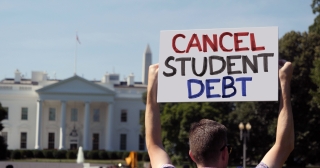
By Andre M. Perry
After months of uncertainty, doubt, and debate among pundits and policymakers, this Wednesday saw President Joe Biden finally announce the details of his administration’s long-awaited action on student debt cancellation.
The plan will cancel up to $20,000 of student debt for Pell Grant recipients with loans held by the Department of Education, and up to $10,000 for non-Pell Grant recipients. Debt cancellations are for people whose incomes are less than $125,000 (or $250,000 for married couples).
According to the White House, the plan will “provide relief to up to 43 million borrowers, including cancelling the full remaining balance for roughly 20 million borrowers.” But it does not go far enough in addressing the root of the problem: a postsecondary education system that has seen tuition rise three-fold in the last 30 years. That same system will put future borrowers in peril.
The plan does take some admirable steps toward helping overburdened graduates. For example, borrower participation in income-based repayment plans was stunted by confounding complexity, bad management, and predatory practices on the part of loan servicers. The Biden plan lowers the amount borrowers have to pay from 10% to 5% of income and forgives loan balances after 10 years, down from 20. Making payments more affordable helps people whose wages do not keep pace with their cost of living and for those whose pay is throttled by wage discrimination.
Biden’s plan also addresses the long-standing problems in the Public Service Loan Forgiveness (PSLF) program, which rejected about 98% of applications prior to his presidency. The plan reiterates the Department of Education’s earlier announcement of a “limited PSLF waiver” that will forgive debts for federal student loan borrowers who have served in a nonprofit, the military, or a federal, state, tribal, or local government for a period of at least 10 years.
The new debt cancellation policy also applies to borrowers who hold Parent PLUS loans, which are federal student loans issued directly to parents. Under these loans, approximately 3.7 million families owe $104 billion for their children’s undergraduate educations, according to a Century Foundation analysis. On average, 55% of the loan’s balance remains after 10 years of repayment, but that figure is 96% for Black families. So, the new policy will benefit families and postsecondary institutions with high percentages of Black students, such as historically Black colleges and universities.
However, the Biden plan certainly has its drawbacks. First is the income limit of $125,000—a response to critics who argued that blanket debt cancellation would benefit the rich. Instead of basing debt cancellation on income, my colleague Carl Romer and I have argued that wealth (a person’s assets minus their debts) should be considered when creating a cancellation plan. We showed that the more debt that is cancelled, the more the racial wealth gap—reflected in racial disparities in default and payoff rates—is narrowed.
By ignoring wealth, income-based debt cancellation plans don’t address the impact of past discrimination. There are many middle-class, low-wealth Black and brown families who weren’t afforded opportunities to build wealth because of past discrimination and have a much more difficult time paying off their loans. The proposal will miss many of those middle-income borrowers who are saddled with debt. In this regard, $20,000 in cancelation as well as the $125,000 income threshold do not go far enough.
A more substantive problem with the plan is that it doesn’t address the massive tuition hikes that have become the norm in postsecondary education. Colleges and universities take advantage of society’s need for people to go to college by capitalizing on a student loan program that floods the market with cash. As taxpayers, we’ve decided to subsidize what we consider a “basic education”—i.e., public elementary and high schools. But for the good of the economy, a college education is now just as basic. We don’t ask people to take out a loan for elementary school; we shouldn’t require it for college either.
Families need a universal public option for four-year postsecondary education. State legislatures have mostly kept tuition among public institutions in check. As a result, public two-year programs have already moved closer to free because federal and state financial aid programs can cover the price of admissions. But until we have a universal public option in both sectors, student loan cancellation is simply kicking the can down the road.
The new plan is a vital recognition from the White House of its power to aid Americans seeking a more prosperous life through higher education. But the systemic deficiencies are too complex to be solved with a simple dollar amount. We should hope that President Biden’s executive action will lead to a new higher education finance system. We can continue to kick the can down the road or confront the challenges that place graduates in the trap of student debt.











